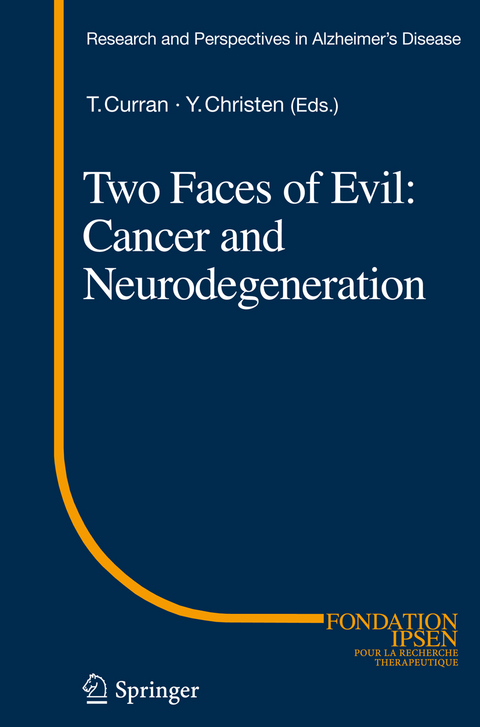
Two Faces of Evil: Cancer and Neurodegeneration
Springer Berlin (Verlag)
978-3-642-26771-0 (ISBN)
Homeostasis involves a delicate interplay between generative and degenerative processes to maintain a stable internal environment. In biological systems, equilibrium is established and controlled through a series of negative feedback mechanisms driven by a range of signal transduction processes. Failures in these complex communication pathways result in instability leading to disease. Cancer represents a state of imbalance caused by an excess of cell proliferation. In contrast, neurodegeneration is a consequence of excessive cell loss in the nervous system. Both of these disorders exhort profound tolls on humanity and they have been subject to a great deal of research designed to ameliorate this suffering. For the most part, the topics have been viewed as distinct and rarely do opportunities arise for transdisciplinary discussions among experts in both fields. However, cancer and neurodegeneration represent yin-yang counterpoints in the regulation of cell growth, and it is reasonable to hypothesize that key regulatory events mediated by oncogenes and tumor suppressor genes in cancer may also affect neurodegenerative processes
lt;p>Foreword.- Mariano Barbacid: Updating the mammalian cell cycle: the role of interphase cdks in tissue homeostasis and cancer.- Karl Herrup: The role of Cdk5 as a cell cycle suppressor in post-mitotic neurons.- Alfred Nordheim and Bernd Knöll: Actin-SRF signaling in the developing and mature murine brain.- Eric C. Griffith, Paul L. Greer, and Michael E. Greenberg: The E3 ubiquitin ligase Ube3A regulates synaptic function through the ubiquitination of Arc. -Thomas Curran: Targeting children's brain tumors: development of hedgehog pathway inhibitors for medulloblastoma.- Young-Goo Han and Arturo Alvarez-Buylla: Primary Cilia as a switch in brain development and cancer.- Freda D. Miller and David R. Kaplan: Nervous system aging, degeneration, and the p53 family.- Frédéric Checler, Julie Dunys, Raphaëlle Pardossi-Piquard and Cristine Alves da Costa: p53, a molecular bridge between Alzheimer's disease pathology and cancers?.- Robert B. Darnell: RNA regulation in neurodegeneration and cancer.- Dengke Ma, Junjie U. Guo, Guo-li Ming, and Hongjun Song: Bridging environment and DNA: activity-induced epigenetic modification in the adult brain.- Harry T. Orr: Cell signaling and neurodegeneration: a link with cancer.- Kenneth S. Kosik, Pierre Neveu, and Sourav Banerjee: The miRNA system: Bifurcation Points of Cancer and Neurodegeneration.- Sathyanarayanan Puthanveettil and Eric Kandel: Molecular Mechanisms For The Initiation and Maintenance Of Long-Term Memory Storage.- Subject Index
From the reviews:
"The authors look at the etiology and molecular pathophysiology of several genes involved in cellular demise and cell proliferation. ... The book is going to be of interest to cell biologists primarily and anyone with an interest in cancer or neurodegeneration." (Joseph J. Grenier, Amazon.com, September, 2013)| Erscheint lt. Verlag | 29.5.2013 |
|---|---|
| Reihe/Serie | Research and Perspectives in Alzheimer's Disease |
| Zusatzinfo | XIV, 166 p. |
| Verlagsort | Berlin |
| Sprache | englisch |
| Maße | 155 x 235 mm |
| Gewicht | 284 g |
| Themenwelt | Medizin / Pharmazie ► Medizinische Fachgebiete ► Onkologie |
| Medizin / Pharmazie ► Studium | |
| Naturwissenschaften ► Biologie ► Humanbiologie | |
| Schlagworte | Cdk2 • Cdk4 • Cdk5 • DNA repair pathway • hedgehog signaling pathway • long-term memory storage • Medulloblastoma • MicroRNAs • myocardin related transcription factor • serum response factor • tumor-suppressor oncogene • Ube3A |
| ISBN-10 | 3-642-26771-8 / 3642267718 |
| ISBN-13 | 978-3-642-26771-0 / 9783642267710 |
| Zustand | Neuware |
| Haben Sie eine Frage zum Produkt? |
aus dem Bereich


